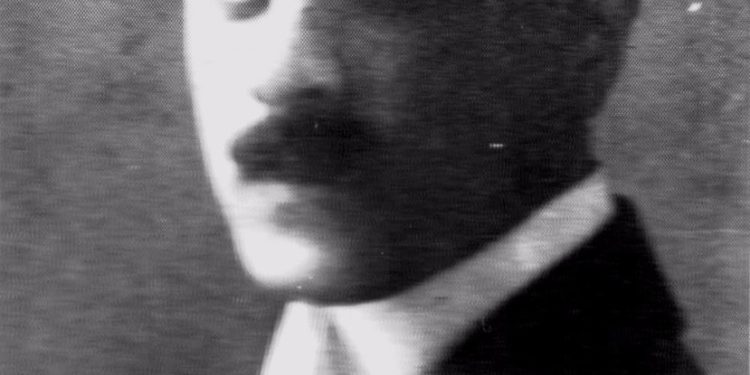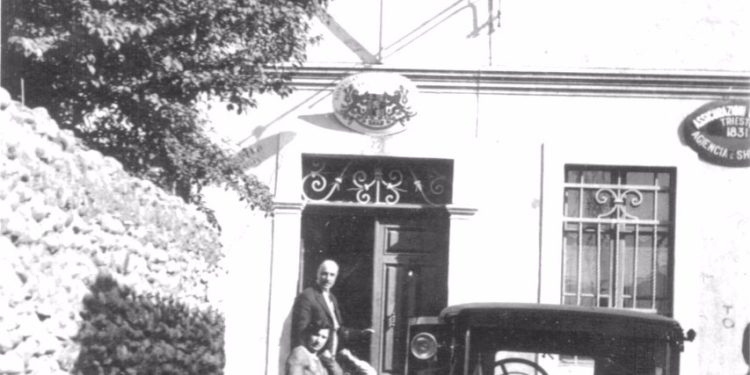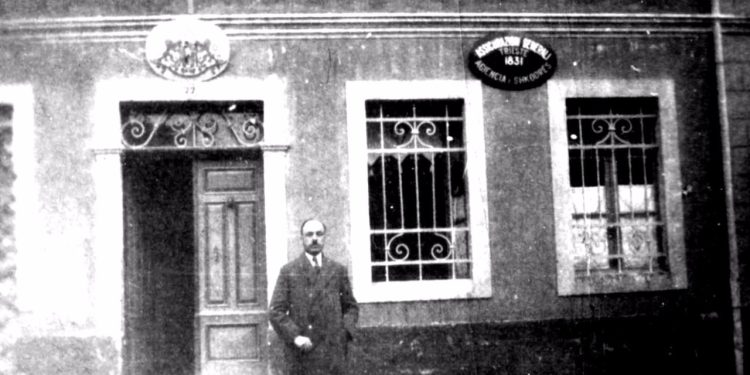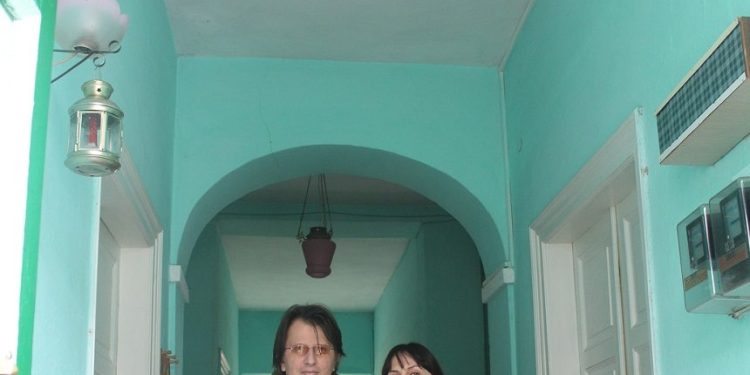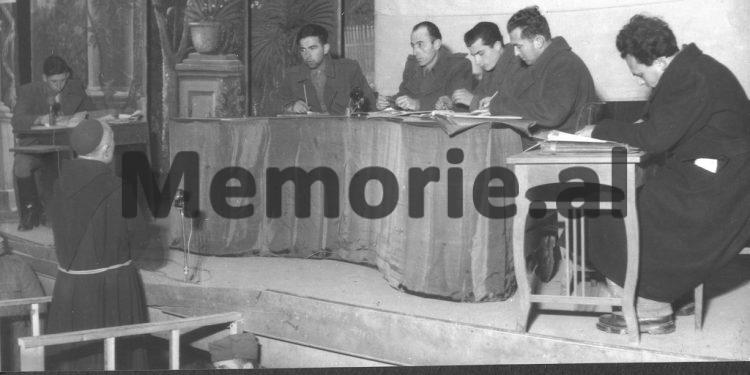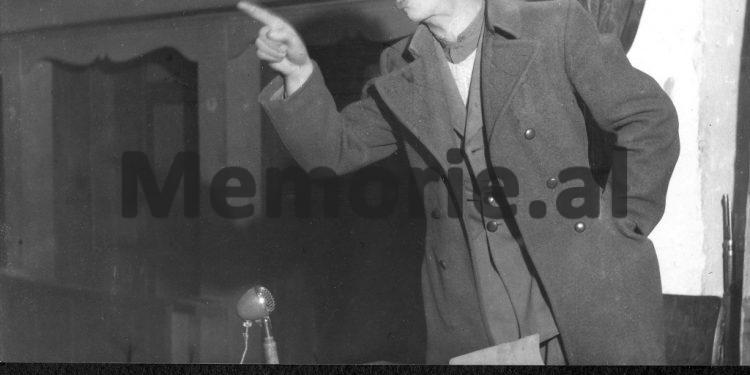By Agron Shala
Memorie.al / Zef Haxhija were among the first Albanian post-war deputies, elected in the elections of December 2, 1945. But two years later, he was arrested by the communist regime, becoming part of the famous trial of the clergy of 1947, which led to the execution of three clergymen, among them Bishop Frano Gjini, while the rest of those tried, among them Father Zef Pllumi, were given various prison sentences by the communist court. Zef Haxhija was sentenced to 5 years in prison, while his wife and 9 children suffered the long ordeal of persecution…!
It was November 20, 1947. In the “Gjuhadol” neighborhood of Shkodra, on the “Gurazezëve” alley, Zef Haxhija, 58 years old, diplomat, deputy and commercial agent, was to be arrested. Zef had graduated from the Technical Commercial School and then from the Military Gymnasium in Turkey. After returning to his homeland, he had first worked as a translator at the Austrian consulate in Shkodra and then as honorary consul of Czechoslovakia, until 1939, when Albania was occupied by Fascist Italy.
He came from an Old Catholic family of Shkodra. His ancestors were skilled merchants, who had traded as far as Mecca, from where they had also taken the surname Haxhija. Zefi married Angjelina Lacaj in 1918 and the Haxhija couple would have a total of 9 children, the eldest of whom was Koleci, and the youngest Hermeneghildo.
The photo where Zefi and his wife appeared together with their nine children clearly demonstrates not only the beauty, but also the former prosperity of some of the famous Shkodra families, as well as the city, the “cradle” of Albanian culture. That photo was taken by the famous photography studio, “Pici”, in 1938. The eldest of the children was Koleci, and the youngest Hermeneghildo. Koleci had graduated in Electrical Engineering in Turin, Italy, and was also a pilot in the Italian Army.
After the capitulation of Italy, he would be captured by the Germans. It is said that the wife of a German general had fallen in love with him, so she had intervened and saved him. After World War II, Koleci would return to his country, because that was what his father had asked him to do when he sent him to study: To contribute to his land and for the good of his people. But his homeland, Albania, did not reward him, on the contrary!
After World War II, Zef Haxhija with his children and wife would continue to live in their separate house in “Gjuhadol” until the day of his arrest. Zefi was among the first Albanian deputies after the war, elected in the elections of December 2, 1945, but with a short political life, as the newly elected regime condemned a large part of the deputies of this legislature, mainly nationalists, concentrating power only in the hands of the communists.
His arrest in 1947 would put an end to his career, but also to his peaceful family life. Everything they had, including their home and property was confiscated by the communist regime and the family was evicted from their home, forcing them to live with relatives for several years, while their home was occupied by tenants, mostly officers from the south.
Next to Zef Haxhië’s large house, one of the most special houses in the city of Shkodra, which he had built for his own pleasure sometime in 1917, a small house, was also built, in which, before the establishment of the communist regime, the employees who served in that house lived. In that house, Zef, his wife and their 9 children would be forced to live after his release from prison. His granddaughter Elektra Haxhia testifies that: “After leaving prison, our grandfather was given only this small apartment, for all 11 family members. The large house, however, was completely freed from tenants only sometime in the early 1980s”.
Zef Haxhija was part of the famous 1947 clergy trial, which led to the execution of three clergymen, including Bishop Frano Gjini, and the rest of those tried, including Father Zef Pllumi, were given various prison sentences. In the trial record for Zef Haxhija, the following biographical data is recorded: “Zef Kol Haxhija, son of Kola and Gjysta, 58 years old, married with 8 children, poor, graduated from the Technical Commercial School, then continued at the Turkish Military Gymnasium, from Shkodra, unaffected by the reform, former MP, listed on the date 20/XI/1947”.
It is noted that in his biography, they noted that the arrested person had 8 children and not 9 as he actually had. Further in the minutes of the court decision, it is noted: “Of the defendants, Zef Haxhia was a Member of the Central Committee of the Christian Democrats, betrayed the people’s trust, as a representative in the People’s Assembly, by associating with fascist and professional terrorist organizations, which were for the violent overthrow of the People’s Government. These crimes are foreseen by articles 2 and 3, points 1, 2, 4, 6, 7, 8, 14 of Law 372”.
In the final decision for Zef Haxhia, a sentence of 5 years of deprivation of liberty and forced labor was given, making him part of a series of political prisoners, who were exhausted in camps, working to drain swamps and build infrastructure, everywhere in Albania, from the South to the North. After completing his sentence, Zef Haxhija returned to his family, with a series of health problems, but continued his life amidst numerous exams together with his children, who were also persecuted by the regime and targeted by the class struggle.
Zef, with his wife and children, lived in the house that we see in the relevant photos attached to this article (new and old photos, exclusive from the family archive), which was designed by the Austrians. The house has eight rooms. But the special thing is that the rooms are designed as a cube. The width and length of each room is 4.5 meters. Even the ceilings are 4.5 meters high, which made it (once and today) the most special house, not only in Shkodra.
The house has a backyard. On the side there is also a small house that was dedicated to servants and that shows the humane treatment that was once given to wage earners in Shkodra. Inside the house there were expensive and luxurious furniture and items. But, they are no longer there. Because, the house was usurped in 1946 by the communists. The property inside was confiscated. The Haxhia family was expelled from there, while Zefi (who died in 1964), would serve a long sentence also for the fact that he was a Member of Parliament, which the new regime of Enver Hoxha did not accept.
Regarding this, Elektra Haxhia testifies: “All nine children of Zef Haxhia were persecuted by the regime. Girls were never allowed to work, except in construction or in heavy physical labor. While the eldest son, who had graduated in Turin as an engineer, returned to help rebuild the country and died ‘accidentally’. The other sons took up trades, but no grandson or granddaughter had the right to be educated. I was the only one who, two years after high school, was granted the right to study in Shkodra,” says Elektra Haxhija.
Zef Haxhija passed away in August 1964, at the age of 74, leaving behind many grandchildren, who faced the fierce class struggle until the end of the communist regime. Of all his children, Hermeneghildo and Davidi (fourth from the left, in the photo above of the Haxhia siblings) are alive today./ Memorie.al




